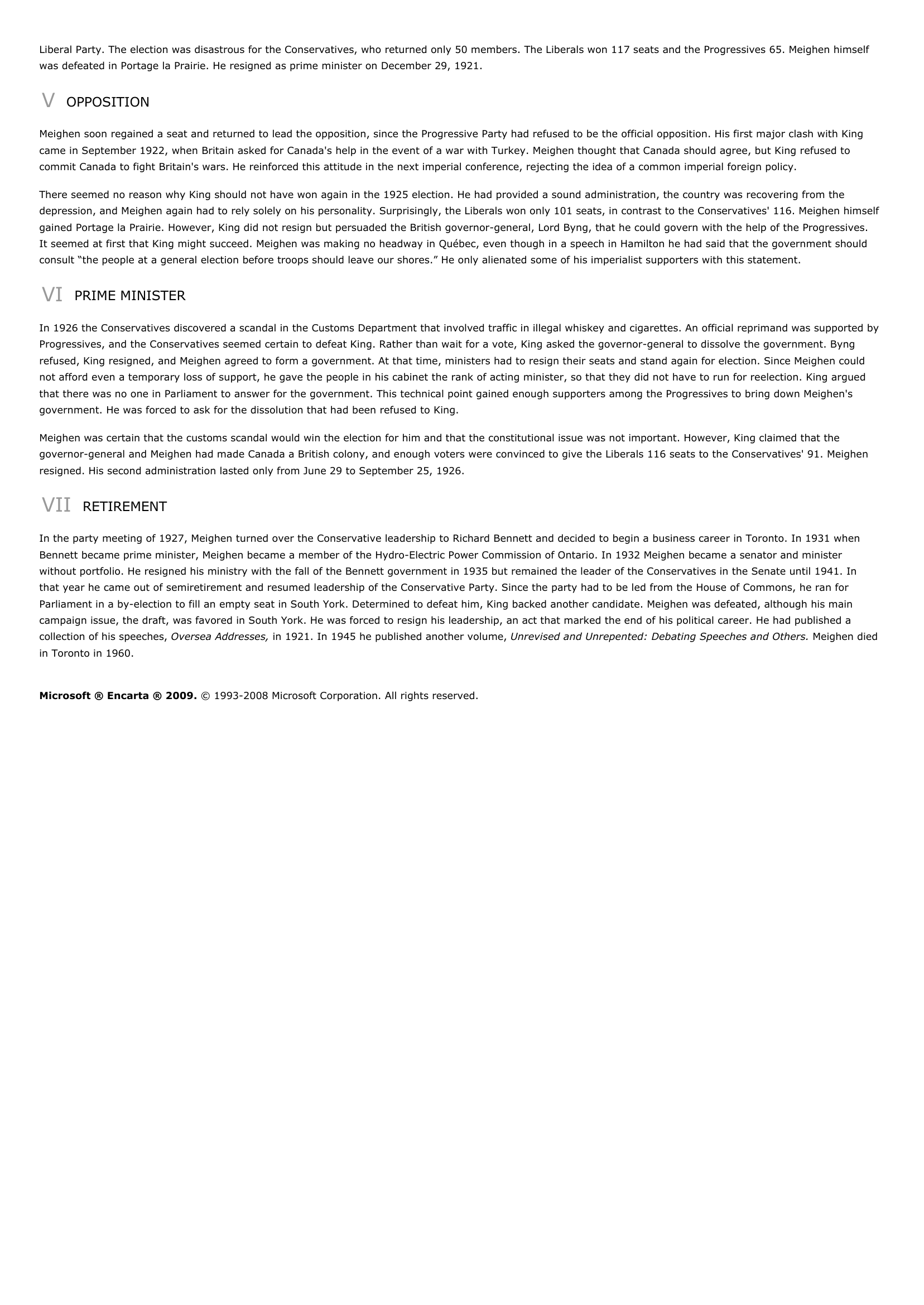Arthur Meighen.
Publié le 10/05/2013

Extrait du document
«
Liberal Party.
The election was disastrous for the Conservatives, who returned only 50 members.
The Liberals won 117 seats and the Progressives 65.
Meighen himselfwas defeated in Portage la Prairie.
He resigned as prime minister on December 29, 1921.
V OPPOSITION
Meighen soon regained a seat and returned to lead the opposition, since the Progressive Party had refused to be the official opposition.
His first major clash with Kingcame in September 1922, when Britain asked for Canada's help in the event of a war with Turkey.
Meighen thought that Canada should agree, but King refused tocommit Canada to fight Britain's wars.
He reinforced this attitude in the next imperial conference, rejecting the idea of a common imperial foreign policy.
There seemed no reason why King should not have won again in the 1925 election.
He had provided a sound administration, the country was recovering from thedepression, and Meighen again had to rely solely on his personality.
Surprisingly, the Liberals won only 101 seats, in contrast to the Conservatives' 116.
Meighen himselfgained Portage la Prairie.
However, King did not resign but persuaded the British governor-general, Lord Byng, that he could govern with the help of the Progressives.It seemed at first that King might succeed.
Meighen was making no headway in Québec, even though in a speech in Hamilton he had said that the government shouldconsult “the people at a general election before troops should leave our shores.” He only alienated some of his imperialist supporters with this statement.
VI PRIME MINISTER
In 1926 the Conservatives discovered a scandal in the Customs Department that involved traffic in illegal whiskey and cigarettes.
An official reprimand was supported byProgressives, and the Conservatives seemed certain to defeat King.
Rather than wait for a vote, King asked the governor-general to dissolve the government.
Byngrefused, King resigned, and Meighen agreed to form a government.
At that time, ministers had to resign their seats and stand again for election.
Since Meighen couldnot afford even a temporary loss of support, he gave the people in his cabinet the rank of acting minister, so that they did not have to run for reelection.
King arguedthat there was no one in Parliament to answer for the government.
This technical point gained enough supporters among the Progressives to bring down Meighen'sgovernment.
He was forced to ask for the dissolution that had been refused to King.
Meighen was certain that the customs scandal would win the election for him and that the constitutional issue was not important.
However, King claimed that thegovernor-general and Meighen had made Canada a British colony, and enough voters were convinced to give the Liberals 116 seats to the Conservatives' 91.
Meighenresigned.
His second administration lasted only from June 29 to September 25, 1926.
VII RETIREMENT
In the party meeting of 1927, Meighen turned over the Conservative leadership to Richard Bennett and decided to begin a business career in Toronto.
In 1931 whenBennett became prime minister, Meighen became a member of the Hydro-Electric Power Commission of Ontario.
In 1932 Meighen became a senator and ministerwithout portfolio.
He resigned his ministry with the fall of the Bennett government in 1935 but remained the leader of the Conservatives in the Senate until 1941.
Inthat year he came out of semiretirement and resumed leadership of the Conservative Party.
Since the party had to be led from the House of Commons, he ran forParliament in a by-election to fill an empty seat in South York.
Determined to defeat him, King backed another candidate.
Meighen was defeated, although his maincampaign issue, the draft, was favored in South York.
He was forced to resign his leadership, an act that marked the end of his political career.
He had published acollection of his speeches, Oversea Addresses, in 1921.
In 1945 he published another volume, Unrevised and Unrepented: Debating Speeches and Others. Meighen died in Toronto in 1960.
Microsoft ® Encarta ® 2009. © 1993-2008 Microsoft Corporation.
All rights reserved..
»
↓↓↓ APERÇU DU DOCUMENT ↓↓↓
Liens utiles
- Arthur Meighen - Biography.
- Arthur Meighen - Canadian History.
- Explication linéaire A la Musique Arthur Rimbaud, Poésies, 1870-1871
- Ophélie d’Arthur Rimbaud
- Lecture Analytique 2 : Vénus anadyomène : Arthur Rimbaud




